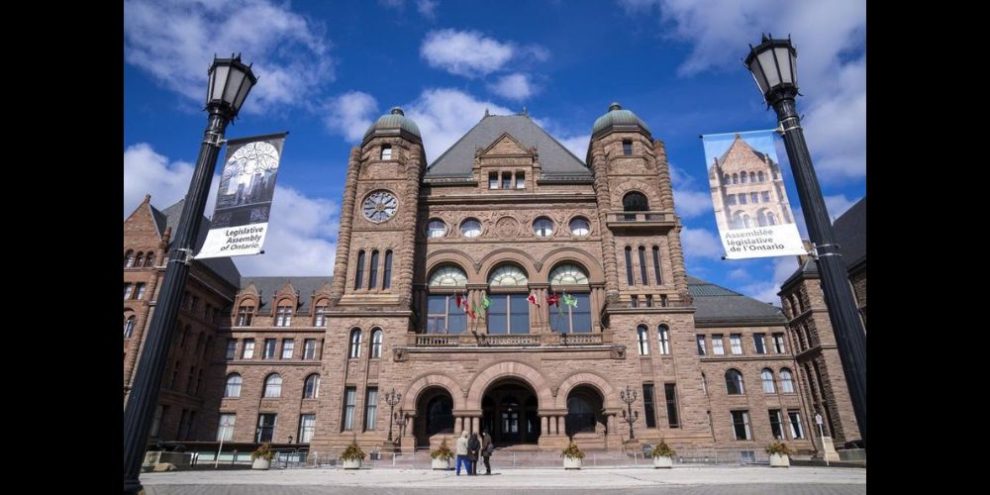
Updated May 1, 2025 @ 3:14pm
Ontario is set to study how it can introduce involuntary addictions treatment for people involved in the correctional system, one of a slate of measures the government is planning as part of – or associated with – a large justice bill tabled Thursday.
However, the details of the legislation the government positioned as being tough on crime were overshadowed by comments from Premier Doug Ford that critics say undermines confidence in the justice system.
The move toward involuntary addiction treatment for people in jail, on probation and on parole is not contained in the legislation itself, rather officials will now look into how this can be done, how much it would cost, what sort of help they would need from the federal government to enact those measures, and consider lessons learned from other jurisdictions.
The ministry intends to present a plan to cabinet by this fall with a plan and options.
Barrie's News Delivered To Your Inbox
By submitting this form, you are consenting to receive marketing emails from: Central Ontario Broadcasting, 431 Huronia Rd, Barrie, Ontario, CA, https://www.cobroadcasting.com. You can revoke your consent to receive emails at any time by using the SafeUnsubscribe® link, found at the bottom of every email. Emails are serviced by Constant Contact
The idea of involuntary treatment has been a controversial one, with advocates arguing that it rarely works and treatment is significantly more successful when someone is ready to quit.
Health Minister Sylvia Jones said she wants to hear from experts and people with lived experience during consultations.
"Look, there's no doubt that there has been an increase in the use of illegal and, frankly, deadly drugs in our communities and, yes, in our corrections facilities," she said Thursday.
"We need to do the work to make sure that any programs that we bring forward are actually going to help people."
Among the measures in the justice bill are steps to make it easier to get restraining orders against domestic violence perpetrators, allow police to more easily seize electronic devices used to commit auto theft, and forces those on probation who wear ankle monitors to pay for them.
But questions about remarks Ford made Wednesday suggesting he wants to see an American-style system of electing judges, whom he criticized as entitled and soft on crime, dominated question period and Attorney General Doug Downey's press conference about the bill.
It is not a plan the province is actually considering, Downey said Thursday.
"I think the frustration that it comes from is real," Downey said. "He's expressing what we're hearing at the doors and what we're hearing from people. It's not something that we're pursuing, but it is important that we go after the offenders, the violent and repeat offenders."
Ford ranted at a press conference Wednesday about judges and justices of the peace who give people bail multiple times, slamming "unelected" judges for "constantly overruling" a democratically elected government.
"Last time I checked, there hasn't been any judges elected," he said. "Maybe that's the problem. We should do what the U.S. does. Let's start electing our judges, holding them accountable. And that's my rant for the day, because I've just had it."
Ford's comments caught the attention of various legal and civil liberties groups, who roundly condemned them.
In a rare move, Ontario's three chief justices also issued a joint statement on judicial independence, which Ford called "a joke."
"Judicial independence is a cornerstone of our constitutional democracy," wrote the chief justices of the Court of Appeal for Ontario, the Superior Court of Justice, and the Ontario court of justice.
"An independent judiciary protects the public, not just judges. It means a society governed by the rule of law."
Liberal Leader Bonnie Crombie said it's not good enough for Downey to dismiss Ford's comments as not being a real policy proposal.
"We cannot pass off an erratic rant and comments made that are later walked back as not serious," she said. "These are very serious matters. The rule of law and order and our judicial system is very serious."
NDP Leader Marit Stiles said Downey should have done more to shut Ford's comments down.
"It's dangerous, and it's inconsistent with where we are as Canadians, and what we want to see in our judicial system," she said.
Ford's comments were prompted by a question about changes in the bill to the judicial appointments process, including a new pool-based recommendation process for judicial positions that would seek to streamline appointments and require a committee to consider criteria set by the attorney general.
The bill would also hold landlords responsible if they knowingly allow their premises to be used for illegal drug activity and improve the collection of forfeited bail money. Through regulation, the government also plans to include sex traffickers in sex offender registry obligations.
On involuntary addiction treatment, two senior government sources who were not authorized to give information publicly said Ontario is looking more to the model in British Columbia, which includes involuntary addictions treatment for people with simultaneous mental health challenges, rather than Alberta's more sweeping approach.
Alberta Premier Danielle Smith's government recently tabled legislation that would allow parents, family members, health-care professionals, police or peace officers to apply for a treatment order. People using substances and deemed a risk to themselves or others could be apprehended by police and ordered into treatment in a secure facility for up to three months, with the possibility of six months in community-based treatment, under the bill.
British Columbia last week announced the opening of a 10-unit facility for involuntary treatment of people already in custody at the Surrey Pretrial Centre, and a second such facility is on the way.
In Ontario, more than 2,600 people died in 2023 from opioids, the last full year of data available, which marks a 50 per cent increase in deaths compared to 2019.
This report by The Canadian Press was first published May 1, 2025.





